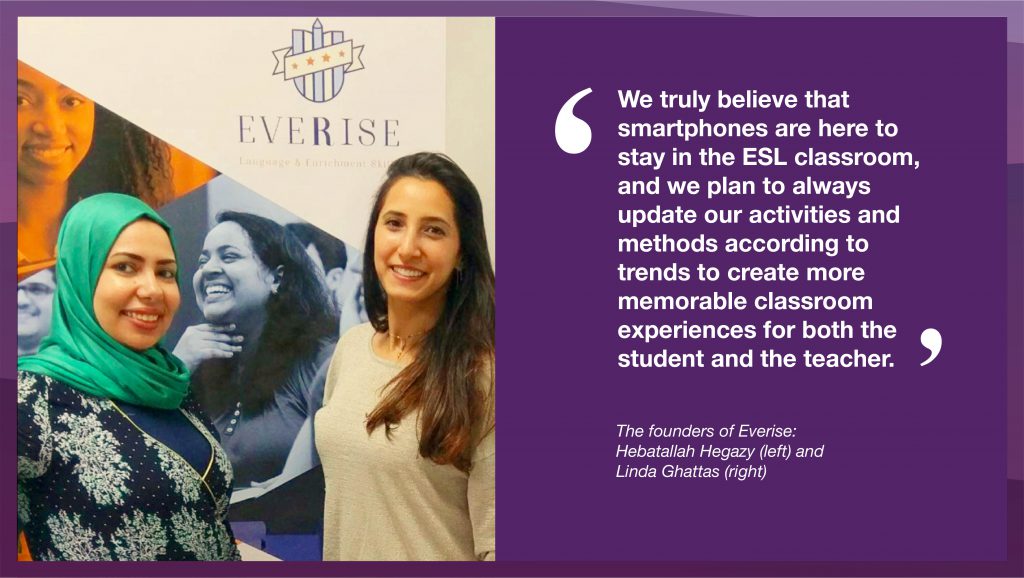In September, Clarity gave a paper on the Dynamic Placement Test at the International Language Assessment Conference in Egypt (ILACE) in Cairo. Sieon Lau (SL) had a chance to talk to Linda Ghattas and Hebatallah Hegazy of Everise (EV), a local community of Egyptian teachers who have the common goal of providing better education to students in Egypt.
SL: Let’s begin by some general questions regarding education in Egypt. What qualifications do people need to become English teachers in Egypt?
EV: Teachers in Egypt are required to have an excellent level of English that equals C1, with a neutral intelligible accent. Most teachers graduate from Faculty of Education. However, some teachers studied other different majors such as pharmacy, media, engineering or even commerce. The reasons for the career shift vary according to each person, yet those who shift careers are mostly women and would like to have a reasonable workload to balance work and house duties. To become more competitive and well-equipped, some teachers work on their skills by attending workshops or diplomas at different institutions, or get an internationally recognized certificate in TESOL.
SL: What challenges do you and your fellow Egyptian teachers face?
EV: Workload, corrections, number of students, and recently change of ethical behavior. For instance, being biased is now a common practice amongst all levels — we have heard cases of head teachers manipulating annual appraisals to stall teachers’ positions; and on a teacher-student level, for example, school teachers may fail students if the students don’t take private lessons with them.
SL: I guess class size is also a problem?
EV: Yes, most governmental schools have around 30 students inside an average-sized classroom and they may sometimes reach 50 students or more. As for private schools, there may be about 25-35 per class.
SL: How would you rate your teaching and learning materials?
EV: The teaching and learning materials provided by the government are of high quality, but I think it would be better if they are revised every couple of years. For example, there is a tendency to focus on grammar when teaching languages, no matter it is English, Arabic or even French and German. The 21st century however, requires more communicative skills, but the materials that are being used don’t allow sufficient focus on skills like speaking and communicating.
SL: Can you tell us about your organisation and what you do?
EV: Everise Language and Enrichment Skills is a community that conducts and facilitates high-quality training, consultancy sessions and workshops. As members of the Everise community, we are here to assist one another by sharing knowledge, skills, advice and practices so that the benefit circulates and prevails. Our services include English language courses, IELTS and TOEFL preparation courses, teacher training and enrichment skills that are represented in a variety of soft and employability skills.
SL: Can you tell us what kind of support you provide to local teachers?
EV: We strongly believe that teachers are the essence of students’ progress and headway, and therefore we try to provide them with all the support they need, whether it’s a newbie teacher or an experienced one, we have professional development opportunities at reasonable prices to suit all. We conduct hands-on workshops that introduce modern practices and techniques, we have free career advice sessions, discounted IELTS classes and so many other packages to encourage educators to work on their skills.
SL: What resources do students have for independent learning (e.g. learning using computer software, tablets)? Are those resources good enough?
EV: In most international schools and some new governmental schools, the use of tablets have been successfully implemented, so students no longer have to carry heavy books in their bags every day. It is a smart move from the government and they are planning to enroll the same experience to all schools in Egypt. Almost every student has access to a computer at school or a mobile phone at home. They don’t use mobile phones for learning though; it is a tool of entertainment and socializing.
As for us at Everise, the blended learning techniques and flipped learning methods we apply definitely put lots of weight on technology and smartphone usage inside the classroom and even outside. We’ve witnessed how students are so attached to their smartphones so we said we might as well use that in our favor; for educational and skill enhancement purposes.
SL: So what ideas do you have in mind? How can we make use of smartphones in the context of education, or even help teachers?
EV: We encourage our team of educators to use smartphones in class activities. We even provide workshops for other teachers to provide them with tons of ideas to use smartphones in the learning process, ranging from vocabulary exercises using Google images and Whatsapp to pronunciation enhancement using recording apps, to keeping journals, and using the camera for new vocab or narration purposes. Furthermore, listening and speaking practice can be done through voicemail and even quiz reminders through Snapchat!
The sky’s the limit for creating engaging, innovative and effective uses for smartphones in the classroom to motivate learners. We truly believe that smartphones are here to stay in the ESL classroom, and we plan to always update our activities and methods according to trends to create more memorable classroom experiences for both the student and the teacher.
SL: What are you looking forward to for the future of education in Egypt?
EV: We aspire to have more skillful workers and one can only become that by having a smart, comprehensive education. We are trying, from our position, to provide the help and support but we must also work hand-in-hand with the government, who can provide help on a much wider scale. The Egyptian Minister of Education, Dr. Tarek Yousry, has a great vision of educated individuals that we truly hope to actualize together.

